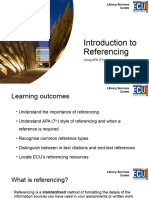Graphie
Uploaded by
Anyak2014Graphie
Uploaded by
Anyak2014When quoting a non-English source (whether in the main text, in a footnote, or on the talk
page), a translation into English should always accompany the quote. Translations published
by reliable sources are preferred over translations by Wikipedians, but translations by
Wikipedians are preferred over machine translations. When using a machine translation of
source material, editors should be reasonably certain that the translation is accurate and the
source is appropriate. Editors should not use machine translations of non-English sources in
contentious articles or biographies of living people. If needed, ask an editor who can translate
it for you.
In articles, the original text is usually included with the translated text when translated by
Wikipedians, and the translating editor is usually not cited. When quoting any material,
whether in English or in some other language, be careful not to violate copyright; see the fairuse guideline.
You might also like
- Stylesheet: - Guidelines For Contributors Page: 1 / 2No ratings yetStylesheet: - Guidelines For Contributors Page: 1 / 22 pages
- Requesting A Translation From A Foreign Language To EnglishNo ratings yetRequesting A Translation From A Foreign Language To English3 pages
- Explain When Straight "Google" Searches Are UsefulNo ratings yetExplain When Straight "Google" Searches Are Useful2 pages
- 4 Bibliography and Reference List DifferenceNo ratings yet4 Bibliography and Reference List Difference3 pages
- OSCOLA Biblio Reference University of PortsmouthNo ratings yetOSCOLA Biblio Reference University of Portsmouth16 pages
- Follow The Instructions: Any of Your Personal InformationNo ratings yetFollow The Instructions: Any of Your Personal Information11 pages
- Citing and Referencing For Academic ReportsNo ratings yetCiting and Referencing For Academic Reports1 page
- How To Prepare Your Manuscript For SubmissionNo ratings yetHow To Prepare Your Manuscript For Submission8 pages
- Acknowledging Sources in Academic Writing: Author-Date System, Based OnNo ratings yetAcknowledging Sources in Academic Writing: Author-Date System, Based On8 pages
- General Rules For Paraphrasing Do:: Write A Literal Paraphrase FirstNo ratings yetGeneral Rules For Paraphrasing Do:: Write A Literal Paraphrase First1 page
- ISHS Authors Guide: Publishing in Acta Horticulturae: References: VitalNo ratings yetISHS Authors Guide: Publishing in Acta Horticulturae: References: Vital8 pages
- When Reviewing an Annotated BibliographyNo ratings yetWhen Reviewing an Annotated Bibliography1 page
- Upute Za Pisanje Teksta Za Strojno PrevođenjeNo ratings yetUpute Za Pisanje Teksta Za Strojno Prevođenje6 pages
- NWU Faculty of Law House Style FINAL - 1No ratings yetNWU Faculty of Law House Style FINAL - 129 pages
- Citation Generator: What Is Cite This For Me's Citation Generator?100% (1)Citation Generator: What Is Cite This For Me's Citation Generator?6 pages
- European Journal of Jewish Studies: Instructions For AuthorsNo ratings yetEuropean Journal of Jewish Studies: Instructions For Authors13 pages
- Gale Researcher Guide for: Taking Responsibility for the Work of Other WritersFrom EverandGale Researcher Guide for: Taking Responsibility for the Work of Other WritersNo ratings yet
- Golden Retriever - The Golden Retriever Was First Developed in The British IslesNo ratings yetGolden Retriever - The Golden Retriever Was First Developed in The British Isles1 page
- Papillon - The Dwarf Spaniel of The 16th Century, Depicted in Many Paintings by TheNo ratings yetPapillon - The Dwarf Spaniel of The 16th Century, Depicted in Many Paintings by The1 page
- Labrador Retriever - The Labrador Retriever Is One of The Most Popular Breeds in TheNo ratings yetLabrador Retriever - The Labrador Retriever Is One of The Most Popular Breeds in The1 page
- Mirror Wikipedia Content Reliable Sources Circular ReferenceNo ratings yetMirror Wikipedia Content Reliable Sources Circular Reference1 page
- Australian Cattle Dog - The Australian Cattle Dog Was Bred To Endure The Heat andNo ratings yetAustralian Cattle Dog - The Australian Cattle Dog Was Bred To Endure The Heat and1 page
- Rottweiler - The Rottweiler, Though Probably Descended From Mastiffs AccompanyingNo ratings yetRottweiler - The Rottweiler, Though Probably Descended From Mastiffs Accompanying1 page
- German Shepherd - One of The Most Compliant Breeds, The German ShepherdNo ratings yetGerman Shepherd - One of The Most Compliant Breeds, The German Shepherd1 page
- Poodle - The Poodle Is Most Likely Descended From Early German Water Retrievers. TheNo ratings yetPoodle - The Poodle Is Most Likely Descended From Early German Water Retrievers. The1 page
- Questionable Sources: Wikipedia:Identifying Reliable Sources Questionable and Self-Published SourcesNo ratings yetQuestionable Sources: Wikipedia:Identifying Reliable Sources Questionable and Self-Published Sources1 page
- Seleucid Empire Parthian Empire Arab Palmyra Baalbek Petra Kingdom of ArabaNo ratings yetSeleucid Empire Parthian Empire Arab Palmyra Baalbek Petra Kingdom of Araba1 page
- Newspaper and Magazine Blogs: Columns Blogs Opinion Piece Self-Published SourcesNo ratings yetNewspaper and Magazine Blogs: Columns Blogs Opinion Piece Self-Published Sources1 page
- References: Uan Humberto Valdivieso Padilla (Born inNo ratings yetReferences: Uan Humberto Valdivieso Padilla (Born in1 page
- Third-Party: University-Level Textbooks Books Published by Respected Publishing HousesNo ratings yetThird-Party: University-Level Textbooks Books Published by Respected Publishing Houses1 page
- Atra (: Arabic Ninawa Governorate Al-Jazira Region Iraq Khvarvaran Baghdad Mosul Isil DemolishingNo ratings yetAtra (: Arabic Ninawa Governorate Al-Jazira Region Iraq Khvarvaran Baghdad Mosul Isil Demolishing1 page
- Demolition by ISIL: Unesco World Heritage Site Saddam Hussein Ninevah Nimrud Ashur BabylonNo ratings yetDemolition by ISIL: Unesco World Heritage Site Saddam Hussein Ninevah Nimrud Ashur Babylon1 page













































































